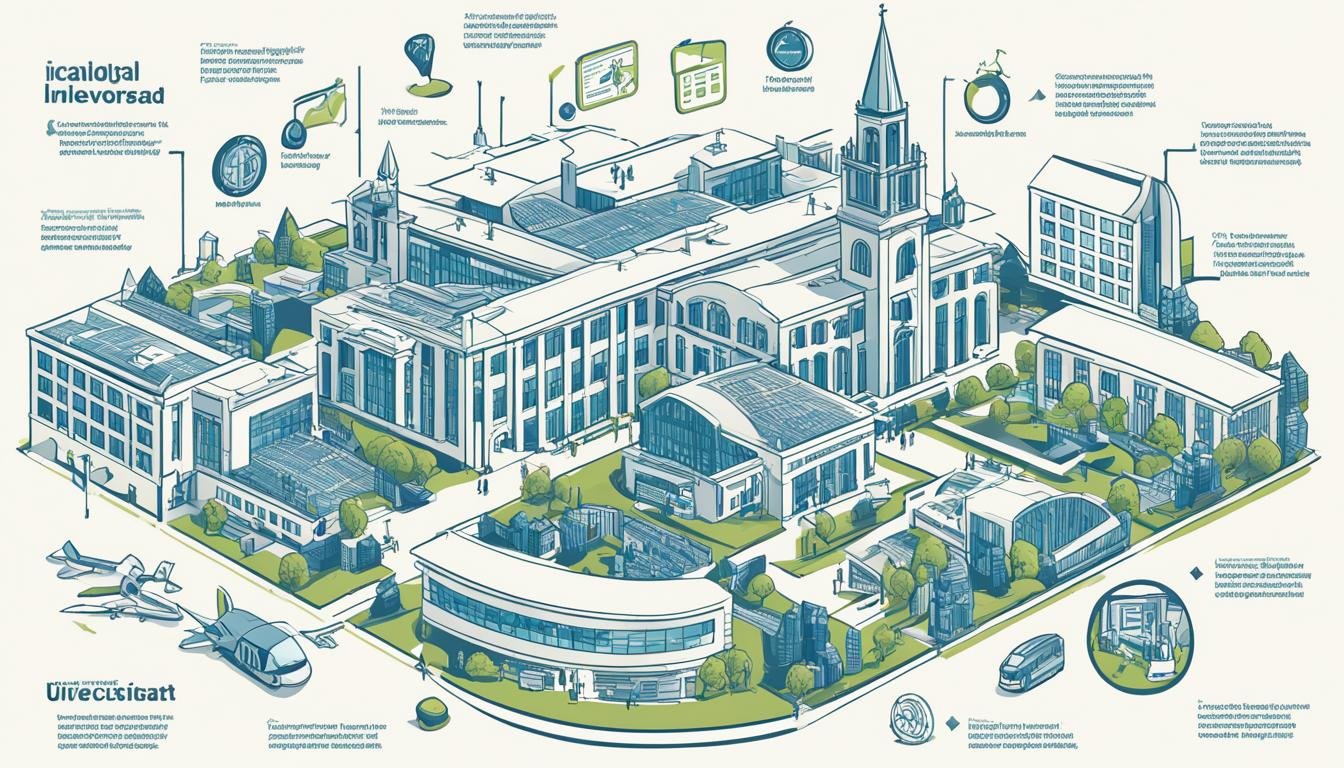The Role of Technological Universities in Ireland’s Higher Education Landscape
Have you ever thought about how technological universities in Ireland are changing higher education? They’re meeting the special needs of local communities.
Technological universities (TUs) are changing Ireland’s higher education. They started after the Technological Universities Act in 2018. These schools focus on science, technology, engineering, and math (STEM) and offer programs from levels 6 to 8. They also support applied research.
Ireland now has five TUs: Technological University Dublin, Munster Technological University, Technological University of the Shannon: Midlands Midwest, Atlantic Technological University, and South East Technological University. This last one started in May 2022. These universities work with industry to create innovative solutions. This helps Ireland’s economy grow.
Key Takeaways
- The Technological Universities Act was enacted in March 2018 to support the establishment of TUs in Ireland.
- There are currently five recognized TUs in Ireland, focusing on industry-specific education and research.
- Each TU is required to consolidate at least two institutes of technology to gain designation.
- Technological universities target levels 6 to 8 of higher education, aligning closely with industry needs.
- The establishment of TUs is integral to the government’s strategy for enhancing educational access and regional economic development.
- Half of all adults in Ireland now have completed a form of higher education, reflecting substantial progress over decades.
Introduction to Technological Universities in Ireland
The start of technological universities in Ireland is a big step forward for the country’s education. These schools focus on hands-on learning and vocational skills. This helps students get into fields like science, technology, engineering, and mathematics (STEM). Ireland has brought together 14 institutes into five technological universities. This change makes education more open and welcoming for all students, including adults.
These universities are more than just places for getting degrees. They work closely with the industry. For example, South East Technological University has over 100 partners in Europe. This means students get to explore more educational options. With over 140 courses, these universities meet the needs of today’s job market.
Studies show that vocational education at these universities helps students get jobs. In 2022, about 82% of graduates found work within nine months. For undergraduates, 75% got jobs quickly. Big companies like Google, Meta, and Microsoft have their European bases in Ireland. This shows how important these universities are for the job market.
The Historical Context of Higher Education in Ireland
The historical context of higher education in Ireland shows a big change starting in the 1960s. Back then, only a few could get in. The 1970s brought Regional Technical Colleges, changing things for the better.
This change made education more open and offered more career paths. Free education in the mid-1990s helped even more people join. By the 2000s, about 70% of students were in higher education. Talks about fees, which were around 3000 euros, show a focus on making education affordable.
The Higher Education Act was updated recently, showing a commitment to new challenges. Now, schools offer many levels of qualifications, from sub-degree to doctorates. This shows the need for more specialized vocational tertiary education.
About half of students get grants, making it easier for more people to go to college. This shows progress but also highlights ongoing challenges in the education system.
Understanding the Technological Universities Act, 2018
The Technological Universities Act, 2018 is a key law for higher education in Ireland. It changed the way education is governed. It was made law on March 21, 2018, and sets the stage for new technological universities. The law requires at least two institutes of technology to merge to become a technological university. This encourages teamwork and new ideas.
This law has strict rules for new universities. They must have qualified staff, be good at research, and meet educational standards. These rules help new universities focus on vocational education and support local growth.
- The change from institutes of technology to technological universities fits with Ireland’s National Strategy for Higher Education to 2030.
- Ten of the fourteen existing institutes have started working together to become technological universities.
- This change is expected to lead to more programs focused on science and technology.
This act could lead to the creation of up to four new technological universities. It aims to boost regional development and offer more chances for people and businesses. The focus on working together shows a strong commitment to the needs of the communities they serve.
The Role of Technological Universities in Ireland’s Higher Education Landscape
Technological universities (TUs) are key to changing Ireland’s higher education. They mix academic study with real-world skills. This ensures graduates are ready for jobs and know both technical and practical skills. TUs focus on education that meets today’s economic needs.
Definition and Purpose of Technological Universities
TUs offer programs at levels 6 to 8 of the National Framework of Qualifications. They aim to prepare a workforce with the skills employers want. TUs make sure graduates are not just book-smart but also ready for the job world.
Differences from Traditional Universities
TUs are different from traditional universities. While traditional schools focus on theory, TUs focus on practical skills. This prepares students for jobs right away and encourages innovation by working with industries. For instance, MTU has seen a big increase in applications, showing people like this approach.
TUs provide hands-on training and research chances that meet industry needs. This makes them key to helping local economies grow.
Current Landscape of Technological Universities in Ireland
The landscape of TUs in Ireland is changing. Schools are working to match their courses with the needs of the economy. Technological universities are key in preparing the workforce for the future. They also help in innovation and economic growth.
Ireland is improving its higher education, making the role of technological universities more important. There are four TUs: TU Dublin, Munster Technological University, Technological University of the Shannon, and Atlantic Technological University. Each one focuses on a different region, offering programs that meet local job needs.
Overview of Established Technological Universities
These universities offer a wide range of courses at both undergraduate and postgraduate levels. They focus on the needs of students and the workplace. This ensures students can move forward in their careers easily.
Working together with other schools helps in sharing students and staff. This makes the learning experience better for everyone. It also helps in solving challenges in both education and the job market.
Regions Served by Technological Universities
Where TUs are located is key to boosting local economies. They design their courses to fit the needs of their area. By working with local businesses and communities, they help create jobs and drive innovation.
This focus on partnerships with local industries is crucial. It helps in building a strong economy ready for the future.
Focus on STEM Education
Technological universities are key in boosting STEM education in Ireland. They make sure their courses match what the job market needs. This means students learn the skills they need for the future.
By focusing on science, technology, engineering, and mathematics, these universities help fill the skills gap. This prepares graduates to make a big impact in a world driven by knowledge.
A big investment of €307 million is planned for higher education. This money will improve the facilities of technological universities. It will also help with mental health support for students, showing how important student well-being is.
But, there’s a big issue: not enough students from disadvantaged backgrounds are in STEM fields. The current funding doesn’t help these students much, making it hard for them to get into STEM. We need to change this to make sure everyone has a fair chance.
The Leaving Certificate shows us how important STEM subjects are. It tells us that we need to keep encouraging students to take these subjects. This is shown in the numbers of students taking physics, chemistry, and technology.
Technological universities focus on giving students practical STEM skills. This makes them more likely to get a job. It’s a win-win situation, where students get the skills they need and employers get talented people.
Industry-Academia Collaboration: A Key Component
Industry-academia collaboration is key in Ireland’s tech universities. It links schools with companies, creating a place where students do well. This partnership makes learning better and gives students real-world experiences.
Benefits to Students and Industry Partners
Students gain a lot from working with companies. They learn by doing real projects. They get to:
- Use what they learned in real situations.
- Meet professionals in their field.
- Solve real-world problems.
Companies also win big from these partnerships. They get new talent and fresh ideas. About 65% of research projects at tech universities work with companies. This teamwork leads to more innovation and helps both students and businesses.
Now, about 78% of grad students do internships or research with companies. This hands-on learning makes them more job-ready. It prepares a workforce that meets business needs.
Regional Economic Development
Technological universities are key to boosting regional economies. They offer training that meets the needs of local industries. This makes sure the workforce is skilled and ready for the job market.
Addressing Local Economic Needs
These universities work closely with local leaders. They make sure their courses match what industries want. This partnership helps create jobs and strengthens the local economy.
Impact on Job Creation
Technological universities help create more jobs. They teach students the skills needed for work. This lowers unemployment and supports sustainable careers.
By matching education with industry needs, they keep talent in the area. This is crucial for the economy to keep growing.
Applied Research and Innovation
TUs focus on applied research and innovation is key to meeting industry and society’s needs. They stand out by applying research findings in real life. This way, students and local communities get direct benefits from their work. Adding applied research to courses makes learning better and encourages students to be innovative and entrepreneurial.
How Technological Universities Engage in Research
Research is a big part of what technological universities do. They work with industry on projects that turn academic knowledge into solutions we can use every day. This teamwork is vital for innovation at TUs. It helps researchers solve big problems and boost local economies.
- TUs get funding for research projects from the government, which gets more students involved in important research.
- Students work closely with professors and industry experts, getting ready for their future careers.
- Research often leads to new products, services, or ways of doing things, showing how research helps society.
The government’s big financial support shows they believe in growing research at TUs. For example, recent funding shows how crucial applied research is. With over 198,000 full-time students, the chance for big research and innovation is huge.
The Importance of Technical Skills and Practical Training
In today’s fast-changing job market, having technical skills and practical training is key. Technological universities offer students the hands-on experience and knowledge they need to succeed. They focus on both academic success and the skills employers want.
Curriculum Alignment with Industry Needs
The courses at these universities are always being updated to match the latest industry trends. This makes sure graduates have the skills needed for today’s job market. Employers look for critical thinking, problem-solving, and good communication skills. So, schools are working to improve these areas in their programs.
- Hands-on training is a big part, with labs, internships, and design thinking workshops.
- Working with industry leaders helps make sure the courses meet real-world needs.
- There are also career development programs, like mentorship and resume workshops, to help students get ready for the job world.
By focusing on practical training, these universities make sure their courses match what industries need. This helps graduates get jobs and boosts the local economy. It also helps the workforce keep growing.
Government Initiatives Supporting Technological Universities
Government efforts are key to boosting technological universities (TUs) in Ireland. These actions show a strong support for TUs, which are crucial for meeting the economy’s changing needs. The Technological Universities Act is a big step forward, setting up how these schools will work.
There are now more funding chances thanks to special programs. These programs help fill funding gaps and help TUs achieve their goals. For example, the Technological Universities Transformation Fund gave money to different schools to improve their abilities. Also, Springboard+ has given a lot of support to education, helping over 100,000 people and putting more than €350 million into helping workers develop their skills.
The Higher Education Authority (HEA) has made plans that fit with bigger changes in higher education. Starting the National Tertiary Office in 2023 shows a big push to make a united post-secondary education system. These changes aim to make it clear what TUs do and how they help the local and national economies.
The policy paper Funding the Future shows a plan to increase core funding for higher education. This highlights the need for TUs to keep up with society’s needs. It also shows how important TUs are for economic growth and innovation.
Conclusion
Technological universities are changing the way we think about higher education in Ireland. They focus on giving students practical skills that are needed in the job market. This makes learning more useful and helps the economy grow.
These schools work closely with businesses, which helps students get jobs after they graduate. This partnership makes sure that what students learn is what employers want. As Ireland deals with the challenges of the global economy, technological universities are key to preparing a workforce ready for the future.
New funding and programs, like the Technological Sector Advancement Fund, show a bright future for these universities. They aim to improve how these schools work and help students succeed more. This will make higher education in Ireland even stronger.
Source Links
- Technological Universities | Higher Education Authority
- Why study at a Technological University in Ireland?
- Higher Education in Ireland | HESA
- Technological Universities in Ireland: the New Imperative
- Fifty years on – limitations and opportunities within Ireland`s higher education system and structures
- Ireland to create new technological universities
- Overview
- Technological Universities
- Technological Universities
- Technological Higher Education Sector – The Technological Higher Education Association
- Template Education Policy Perspectives
- Layout 1
- TU Research Network (TURN) | Higher Education Authority
- Collaboration within Academia and with Industry | Responsible Conduct of Research
- The Tertiary Education Landscape
- Education Policy Perspectives – Consideration of an optimal representation for the technological higher education sector in Ireland
- Opinion Piece: What is the Idea of a University in 2025?
- Technical Universities: A Historical Perspective
- Pedagogical Orientations and Evolving Responsibilities of Technological Universities: A Literature Review of the History of Engineering Education
- Tertiary Education in Ireland
- National reforms in higher education
- Masters of the Universe or Survival of the Fittest: Rethinking Strategy Development in a Technological University
- Technological Universities








